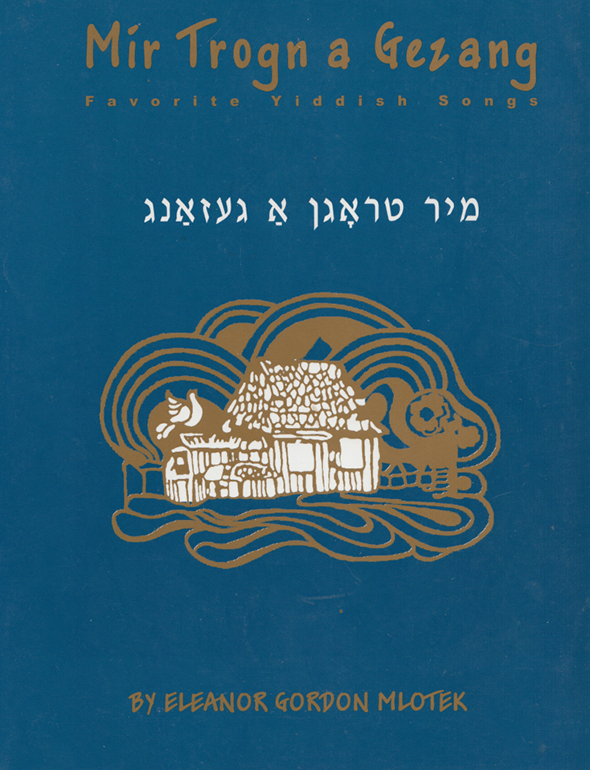A Yiddish version of the English song, Old King Cole. Poem and music by Moshe Nadir (1885 – 1943). One folklorized version was published anonymously by S. Bastomski in 1923. The text and music were published by M. Nadir in 1927, as well as in the author’s book A Lomp Oyfn Fentster in 1929.
The last stanza of the original text reads:
“Er hot geton a gutn genets / Un gezogt: me darf shoyn meyn nit! / Un geshikt di kapelye aheym. Di shikere kapelye fun Rebn Meylekh-Elye, / Hot oysgeshtelt dem dales a fayg. / Di freylekhe kapelye hot gehopket biz der stelye / Un zikh farbitn mit di klaper-getsayg. Di fidldike poyker hobn tsimbldik gefidlt, / Un bronfndik gegosn zikh mit vayn. / Di lustike klezmorim mit flesher untern orem, / Hobn gehulyet bizn heln tog arayn.” (He yawned, said it was enough, and sent his musicians home. The drunken band of Rabbi Meylekh-Elye danced and cavorted merrily, exchanging instruments. They caroused until dawn.)

When Rebbe Elimeylekh
became very happy,
became very happy, Elimeylekh,
he took off his tfillin
and put on his glasses
and sent for his two fiddlers.
And the fiddling fiddlers
fiddled in a fiddly way
in a fiddly way, they fiddled.
And when Rebbe Elimeylekh
became even happier,
became even happier, Elimeylekh,
he made short work of Havdole*
with his shames Reb Naftole,
and sent for his two drummers.
And the drumming drummers
drummed in a drummy way,
in a drummy way, they drummed.
And when Rebbe Elimeylekh
became utterly happy,
became utterly happy, Elimeylekh,
He took off his long festive coat
and put on his yarmulke,
and sent for his two cymbalists.
And the cymbal-playing cymbalists
played their cymbals in a cymbally way,
in a cymbally way, they played.
*The ritual at the end of Shabes.
Az der Rebe Elimeylekh
lz gevorn zeyer freylekh,
Is gevorn zeyer freylekh, Elimeylekh,
Hot er oysgeton di tfiln
Un hot ongeton di briln
Un geshikt nokh di fidlers di tsvey.
Un di fidldike fidlers
Hobn fidldik gefidlt,
Hobn fidldik gefidlt, hobn zey.
Un az der Rebe Elimeylekh
lz gevorn nokh mer freylekh,
lz gevorn nokh mer freylekh, Elimeylekh.
Hot er opgemakht havdole
Mitn shames Reb Naftole
Un geshikt nokh di payklers di tsvey.
Un di paykldike payklers
Hobn paykldik gepayklt.
Hobn paykldik gepayklt, hobn, zey.
Un az der Rebe Elimeylekh
lz gevorn gor shtark freylekh,
lz gevorn gor shtark freylekh, Elimeylekh.
Hot er oysgeton dos kitl
Un hot ongeton dos hitl,
Un geshikt nokh di tsimblers di tsvey.
Un di tsimbldike tsimblers
Hobn tsimbldik getsimblt
Hobn tsimbldik getsimblt, hobn zey.
אַז דער רבי אלימלך
איז געװאָרן זײער פֿרײלעך,
איז געװאָרן זײער פֿרײלעך אלימלך,
האָט ער אױסגעטאָן די תּפֿילין
און האָט אָנגעטאַן די ברילן
און געשיקט נאָך די פֿידלערס די צװײ.
און די פֿידלדיקע פֿידלערס
האָבן פֿידלדיק געפֿידלט,
האָבן פֿידלדיק געפֿידלט, האָבן זײ.
און אַז דער רבי אלימלך
איז געװאָרן נאָך מער פֿרײלעך,
איז געװאָרן נאָך מער פֿרײלעך אלימלך,
האָט ער אָפּגעמאַכט הבֿדלה
מיטן שמשׂ ר׳ נפֿתּלי
און געשיקט נאָך די פּײַקלערס די צװײ.
און די פּײַקלדיקע פּײַקלערס
האָבן פּײַקלדיק געפּײַקלט,
האָבן פּײַקלדיק געפּײַקלט, האָבן זײ.
און אַז דער רבי אלימלך
איז געװאָרן גאָר שטאַרק פֿרײלעך,
איז געװאָרן גאָר שטאַרק פֿרײלעך אלימלך.
האָט ער אױסגעטאָן דאָס קיטל
און האָט אָנגעטאָן דאָס היטל
און געשיקט נאָך די צימבלערס די צװײ.
און די צימבלדיקע צימבלערם
האָבן צימכלדיק געצימבלט,
האָבן צימבלדיק געצימבלט האָבן זײ.
Song Title: Der Rebe Elimeylekh

First published in 1972, Mir Trogn A Gezang: Favorite Yiddish Songs was reprinted six more times (in 1977, 1982, 1985, 1987, 1988, 2000) due to popular demand. The songs in this anthology represent a sampling of beloved folk and well-known Yiddish songs, many of which are scattered in various song collections; some appear in very rare and inaccessible collections; and some were never before published. Folk songs comprise about a third of this volume and were selected mainly on the basis of popularity and sometimes for their historic significance. Needless to say, they are only representative of the vast, rich treasure of Yiddish folk material. The selection was made not only on the basis of personal preference, but in the knowledge they are favorites of many who sing these songs. Most of the songs represent the repertoire that was sung at Yiddish summer camps, May 1st demonstrations and at social gatherings. Many songs were introduced to American Jewry by Jewish immigrants who came to the United States after World War II, for whom these songs had been favorites in Poland and other East European communities destroyed by the Nazis.